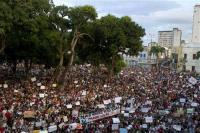Update 9/14/13: There is now a petition available here!
The Brazilian Spring: Still Under Construction
Brazil went to the streets in June this year with crowds never before seen in the history of the country. There were young workers and students who were demonstrating for the first time, but also sectors of the middle class and union members as well as social movement and left party activists who protested about a wide diversity of issues.
Mexican Teachers’ Massive, Militant Strikes and Demonstrations Face an Intransigent Government
Teachers, whose unprecedented strikes and massive, militant protests by tens of thousands have shaken Mexico over the past week, may be headed for what could be a violent confrontation with the government. As the teachers’ strikes and demonstrations led by the National Coordinating Committee (la CNTE), a rank-and-file caucus within the Mexican Teachers Union (el SNTE), have become more extensive and militant, so too has the government of President Enrique Peña Nieto become more intransigent.
Yes, We Can
 We hoped that our book, Continental Crucible, would open up a discussion of the future of the North American Left and labor movement, a discussion that is urgent in the face of the relentless capitalist offensive of the last forty years.
We hoped that our book, Continental Crucible, would open up a discussion of the future of the North American Left and labor movement, a discussion that is urgent in the face of the relentless capitalist offensive of the last forty years.
Mexican President Proposes Opening State Oil Company To Private And Foreign Investment; U.S. Corporations Line Up To Return
Mexican President Enrique Peña Nieto and his Institutional Revolutionary Party (PRI) have proposed constitutional changes and legislation that would for the first time since 1938 allow foreign companies to explore for and produce oil in
A PEOPLE’S HISTORY OF THE MEXICAN REVOLUTION
Book Review of Stuart Easterling. The Mexican Revolution: A Short History, 1910-1920. Chicago: Haymarket, 2012. Ilustrations. Chronology. Index. Notes. 167 pp.
After 65 Years—Will Peace Finally Come to Colombia?
Colombia has the longest history of ongoing political violence in Latin America. Some date the beginning as April 9, 1948 when Jorge Eliécer Gaitán, the Liberal Party’s presidential candidate, was assassinated, leading to the Bogotazo riots that took 5,000 lives and unleashed a civil war between Conservatives on the one hand and the Liberals and Communists on the other. Between 1948 and 1958 that war took 200,000 more lives, injured hundreds of thousands more, and displaced perhaps a million.
Tip of the Iceberg
The roll of names was impressive: Iñaki García, María Francisca Ize-Charrin, Louise Arbour, Giovanni di Girolamo, Erika Mann, Alberto Ignacio Glender, Alexander Koeln, Teresa Ávila, Eva Lichtenberger — all with impressive titles and extensive backgrounds in government, jurisprudence, and human rights.
Men Without a Country: Snowden and Trotsky
I have been following the story of Edward J. Snowden, so far the most famous man of the twenty-first century without a country, who at the moment bides his time in an international way station in Moscow waiting for some country to offer him a visa and asylum. A whistle blower who revealed that the U.S.
Brazilian Spring: a general panorama and some perspectives
[Mass protests have been taking place in all the major cities of Brazil for the past week, beginning with a demand to reduce bus fares and expanding into a mass movement that demands improvements in all public services, health, education, and working peoples’ rights.
The End of Lethargy in Brazil
 Our country was at the forefront of social and political struggles in the 1980s, and succeeded in preventing the introduction of neoliberalism in Brazil, so that Latin America’s “lost decade” was, for social movements and popular politicians in our country, exactly the opposite.
Our country was at the forefront of social and political struggles in the 1980s, and succeeded in preventing the introduction of neoliberalism in Brazil, so that Latin America’s “lost decade” was, for social movements and popular politicians in our country, exactly the opposite.
Creating a Transcontinental North American Working Class Movement
Richard Roman and Edur Velasco Arregui. Continental Crucible: Big Business, Workers and Unions in the Transformation of North America. Halifax & Winnipeg: Fernwood Publishing, 2013. 148 pages. References. Index. Paperback. Price: $19.95 CAN.
The Persecution of the Mexican Miners
Napoleon Gómez. The Collapse of Dignity: The Story of a Mining Tragedy and the Fight Against Greed and Corruption in Mexico. Dallas, TX: BenBella Books, Inc., 2013. 344 pages. Photos. Index. $26.95 U.S. / $36.00 CAN / Kindle $11.99.
Mexican Teachers Rebel Against Government's Educational Reform
Mexican teachers, particularly in the south of the country, have joined a regional rebellion of rank-and-file teachers that erupted in violence in late April. In the state of Guerrero the offices of all three major political parties were vandalized and set afire to protest their support for the educational reform passed by congress and the states over the last five months. At the same time there have been marches and demonstrations in several other states, and there are plans afoot to strike indefinitely beginning on May 1.
Nicaragua Notes: The Watchmen, the Hunters and Gatherers, the Street Vendors
The Watchmen
In Managua one finds uniformed guards in front of the banks, in the shopping malls like Metro Centro, in the grocery stores, and anywhere else there is likely to be substantial amounts of money. These men have the status bestowed by a uniform and the authority commanded by carrying a pistol. One could say that they are the elite of their profession, but they are far outnumbered by the lumpenguardia found on every middle class street of the capital city.
President Pena Nieto on a Roll
Mexican President Enrique Peña Nieto is definitely on a roll. For Peña Nieto, the Institutional Revolutionary Party which he heads, and the business class that he represents, things could hardly be going better.
Even before becoming president, the former administration of Felipe Calderón of the even more conservative National Action Party (PAN) passed the Labor Law Reform sought by business organizations since the 1980s.
Mexican Teachers Union Leader Jailed For Stealing Union Funds
In a major event that will have a serious impact on Mexican politics and labor unions, Elba Esther Gordillo, who for more than twenty-five years has led the Mexican Teachers Union (el SNTE), was arrested on Feb. 26 on the charge of embezzling millions of dollars in union funds which she reportedly deposited in banks in Europe and spent on real estate.
Nicaragua: Hunger, Malnutrition, and the Fight to End Them
School began this week for children all over Nicaragua, but even before children entered the classroom the Nicaraguan government had begun supplying its School Feeding Program as the Ministry of Education transferred food from warehouses to 10,000 schools in 153 municipalities. For many Nicaraguan children, the School Feeding Program is essential to preventing hunger and malnutrition.
The Machete and the Pen
In Redeemers: Ideas and Power in Latin America, Enrique Krauze is interested in all of the most romantic figures of the modern left in Latin America, those who lived as militant missionaries, often died as martyrs, and were canonized by the left as saints, men like José Martí, Che Guevara, Subcomandante Marcos, and Hugo Chávez.
Nicaragua: Contentious Debate Over Social Security Reform
Nicaragua is in the midst of a contentious debate that could become a serious social struggle over the reform of the nation’s Social Security system. President Daniel Ortega’s Sandinista government has proposed to increase the retirement age, the number of years one has to work, and the number of required contributions.
What Happened to the Nicaraguan Revolution?: A View from the Rank and File
When the Sandinista National Liberation Front (FSLN) led the Nicaraguan people to victory over the dictatorship of Anastasio Samoza in 1979, Wilmer (not his real name) was only 14 years old. Having come from a family of modest means, he identified with the revolution that ended the long repressive rule of the Samoza family that with U.S. backing had for 43 years run, ransacked and ultimately ruined Nicaragua.
